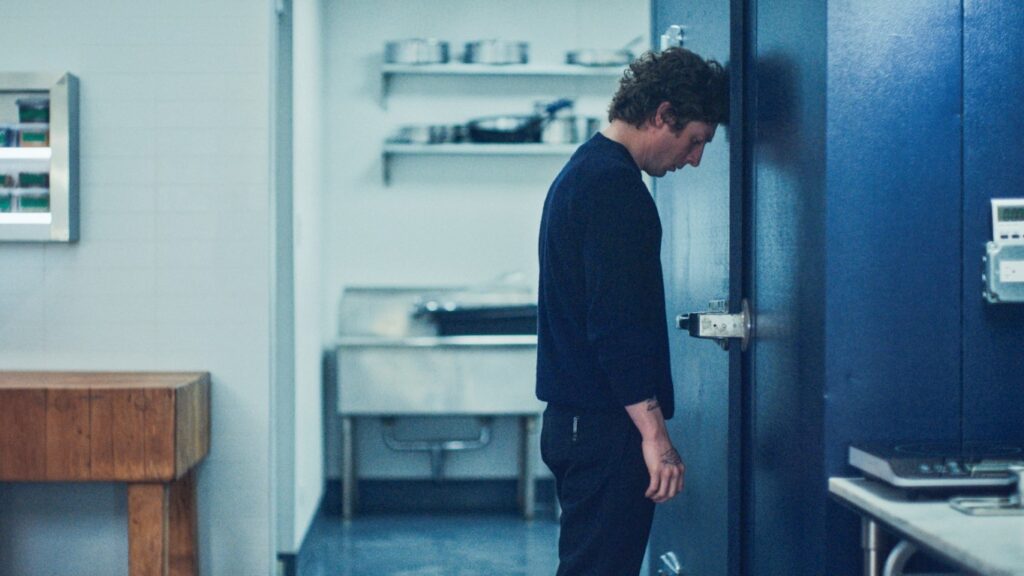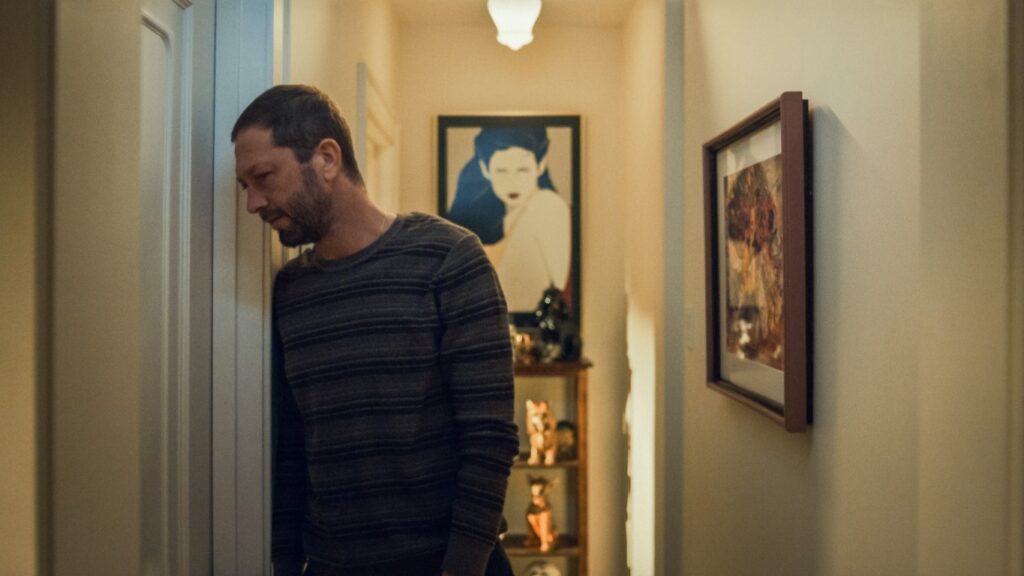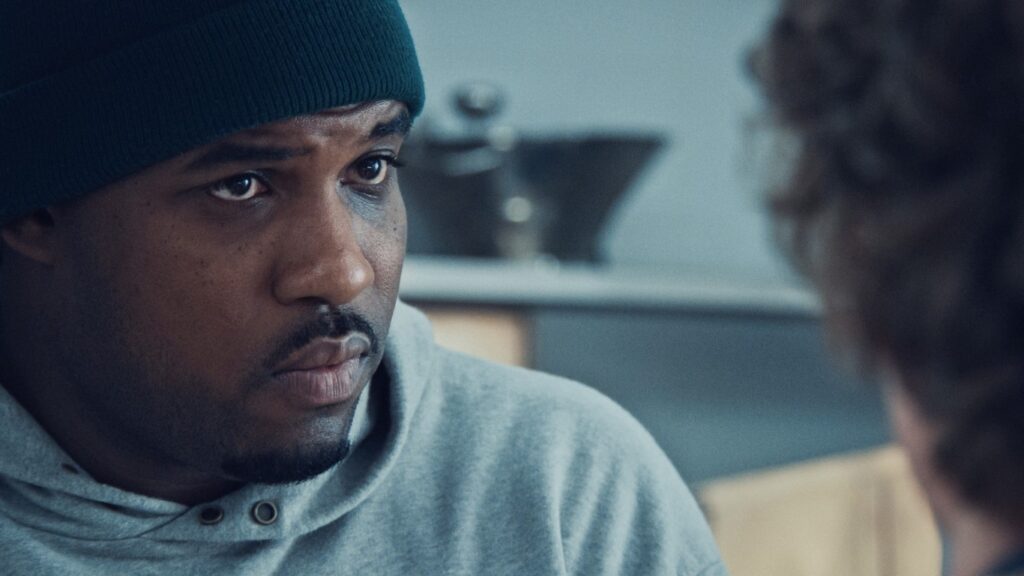So it’s fairly obvious that the first two seasons of The Bear had a whole birth/death thing going on. The show opens in the aftermath of the shocking and abrupt suicide of Mikey Berzotto (John Bernthal), and the first season charts the slow, inevitable death of his restaurant, The Beef, under the stewardship of his little brother Carmy (Jeremy Allen White) and best friend Richie (Ebon Moss-Bachrach). The second follows the birth of The Bear, the new restaurant that rises from the ashes of The Beef, as well as the blossoming of many of its employees from a sloppy blue-collar crew to a careful, refined, highly efficient team. And Carmy flirted with birthing a life outside the kitchen through his relationship with old-flame-from-back-in-the-day Claire (Molly Gordon).
But while the first season ended in pretty unambiguous triumph when Carmy, Richie, and the rest of the Beef staff were suddenly flush with cash and a plan for the future, season two ends on a significantly darker note. The Bear manages to open its doors on time and have a successful opening night, but Carmy’s relationships with Richie and Claire are in tatters—casualties of Carmy’s rage and anxiety.
There was a kind of dry run for the catastrophe that closed the end of season two near the end of the first. Carmy loses his shit, breaks a bunch of stuff, yells, and alienates pretty much everyone. But the final episode brought them all back together, stronger than ever. Carmy is what George Costanza would describe as a “delicate genius,” ferociously gifted but intense and unpredictable. To work with him is to warm yourself by the raging fire of his mind while trying to avoid getting burned by the constant sparks and flares that burst from it.

The show did an elegant job pacing Carmy’s assholeishness with revelations about his past home and professional life. He grew up in a single-parent home with an alcoholic, mentally unwell mother, prone to fits of rage and depression. He worked under a monstrously critical chef while he was coming up, who criticized and undermined everything he did. These revelations are for the audience, not necessarily the other characters in the show. So when Carmy melts down in a fit of panic and self-loathing on opening night, we know it’s informed by his hyper-tense childhood and abusive mentor. But the people who work under him don’t. Some know parts, but no one knows everything. And it’s harder for them to understand.
Now we come to season three, and the completely reasonable expectation is that it will open much like season one closed. Having learned a valuable lesson, Carmy will gather the crew back together, apologize, and things will return to normal in the kitchen. Oh, it might take a little longer for some of them to come around than others, but everything will work itself out. Except it doesn’t. Because while the first two seasons were concerned with birth and death, the third is a lot more about life. And the thing about life is that it’s its own thing, separate from birth and death. They’re related, obviously, but life is also a distinct thing in ways that birth and death are not.
Birth and death take place out of time and give you permission to ignore the responsibilities of life and focus on what’s in front of you. They’re big, passionate, and exciting for all those reasons but also because they’re markers of significant change. Life, on the other hand, is about the maintenance of existence. It’s about the mundanity of getting up every day and managing all the maintenance and responsibilities that come with occupying a body and sharing space with other people. It’s about trying to hold yourself together while everything changes around you.

That’s why a show about a restaurant is such a potent metaphor for life, right? Because you gotta stop what you’re doing every day for at least a moment, and eat. You can’t live unless you can eat. And eating is where so many of our social and familial relationships play out. It’s an excuse to spend time together. Do you want a good example of how birth and death exist separately from life? You have a baby or lose a loved one, and what do people do? They bring you food and leave without eating it. You are exempted, for a moment, from the tasks of living. It’s like going to a restaurant.
For the first two seasons of The Bear, pretty much every character was focused on the restaurant. There were side plots, of course, Carmy and Claire. Richie navigates a separation from his wife and daughter. Sydney (Ayo Edebiri) makes her way up the ladder from temp-for-a-day up to sous chef and potential co-owner of The Bear while struggling with whether she can work under the emotionally undisciplined and unreliable Carmy. Carmy’s older sister Nat (Abby Elliot) goes from being basically an outsider in season one to being pregnant and co-owner in season two. Baker Marcus (Lionel Boyce) travels to Copenhagen to learn how to make artisanal desserts and tries not to worry too much about his mom, who’s dying back home in Chicago. And stubbornly self-sufficient Tina (Liza Colon-Zayas) learns to relax her guard and try new things.
But none of those plots are resolved in season two. Richie doesn’t move on from his wife; Syd is still unsure about working with Carmy at The Bear. Nat doesn’t have her baby. Marcus gets a phone call about his mom, but we don’t know what he learns, making her a kind of Schroedinger’s Mom, both alive and dead. And Carmy and Claire are in limbo.
Season two is about the birthing of The Bear, and how when something is birthing, you ignore everything else. But The Bear isn’t being born anymore, and it’s not dying like The Beef had to. It’s just… alive. And that means it’s time to do living shit. And that doesn’t mean there are no births or deaths in season three; there are, in fact both. It just means that the show isn’t fixated on them. Each event gets an episode to address it, then it’s on to other things. There are other metaphorical births and deaths as well. Richie lets go of his marriage and starts thinking about what’s next, and a flashback shows how Tina transitioned from an office worker to a kitchen employee. But they’re all part of the greater whole, which is life. And that’s not to suggest that what any of those characters go through is any less significant than Mikey’s death or the birth of The Bear. It’s just that this season is about life, and in life, you keep it moving.

And that’s a good thing. Because as devastated as Marcus is about his mom, he still has the work delights him and the friends he loves. He can divest his mind and heart into many things, and that helps him deal with the pain. Richie, too, gets reprieves from his heartbreak for many of the same reasons. And for Richie, it’s hard to imagine he would have been able to accept that his marriage was over without all the life he’s let in over the last two seasons. Carmy and Syd are the only two characters who don’t get any closure, because all they have is The Bear. All they really care about is the never-ending cycle of opening and closing, preparing food, sending it out, cleaning it up, and starting all over again. They just have work. They don’t have lives.
Season three is bookended by two funerals: the first is for a person, the second for a restaurant. And they are very different kinds of funerals indeed. The funeral for Marcus’s mother is a sober, somber affair. On the other hand, the funeral for Ever is a joyous celebration. Because the end of life is terrible, but the end of work doesn’t have to be. Chef Andrea (Olivia Coleman) isn’t closing Ever because it’s going bankrupt because of some scandal or because she’s sick. She does it because she wants to. She wants to break out of the unending cycle of preparing food for other people, as rewarding as that was, and try new things. There’s a moment towards the end of Ever’s funeral where Andrea and Carmy are standing outside, and Andrea tells Carmy that she’s thinking about taking up smoking. It’s a joke, hopefully, anyway, but it’s also a sneaky nod to the birth/death dyad that drove the first two seasons. Here she is, at the beginning of her new life, and Andrea is considering taking up a habit that could lead to her death.
The Bear closes with Syd crouched just outside the raucous party at her new apartment, paralyzed by panic over whether she wants to stay at The Bear or move on to a new, hopefully less stressful kitchen, and with Carmy walking alone on the streets of Chicago. We don’t know where he’s going or why, maybe to try and patch things up with Claire, see his sister and niece, or have the conversation with his mom that he’s been avoiding for three seasons now. But he stops to check his vibrating phone and sees that the review they’ve been waiting for all season has finally come out. And while it’s unclear how positive or negative it is, what is clear is that it’s knocked Carmy off whatever path he was on back into work.
Jeremy Allen White will play Bruce Springsteen in a movie next year, and Springsteen once said that the best days in his life were the day he picked the guitar up and the day he put it down. The day he found the passion and joy that comes from work and recognized that he needed more. Carmy and Syd are still holding their guitars, but their grip is also loosening. They’ve seen how letting go of work and engaging with life has enriched the people around them, but they haven’t yet found the courage to try it themselves. Hopefully, they’ll figure it out next season. Or maybe they won’t. That’s life.
All episodes of The Bear are currently streaming on Hulu.